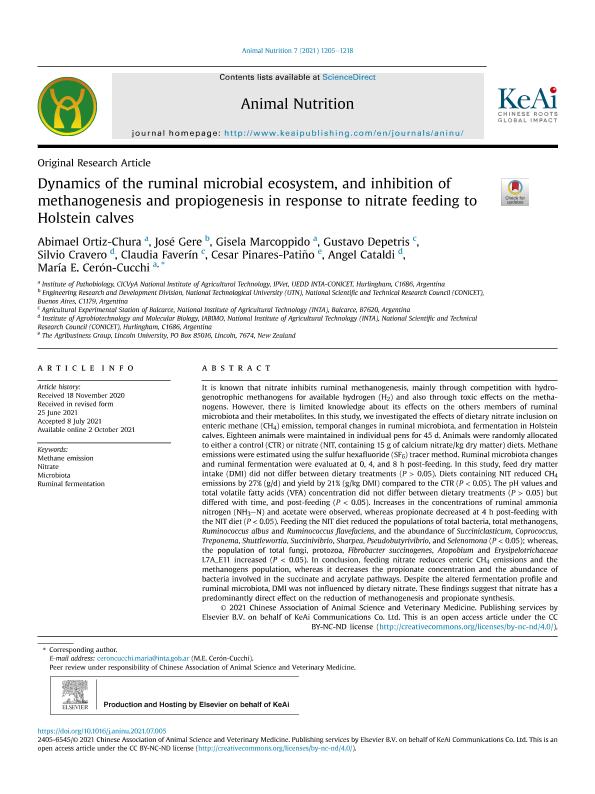Artículo
Dynamics of the ruminal microbial ecosystem, and inhibition of methanogenesis and propiogenesis in response to nitrate feeding to Holstein calves
Ortiz Chura, Abimael ; Gere, José Ignacio
; Gere, José Ignacio ; Marcoppido, Gisela Ariana
; Marcoppido, Gisela Ariana ; Depetris, Gustavo Jesus; Cravero, Silvio Lorenzo Pedro; Faverín, Claudia; Pinares Patiño, Cesar; Cataldi, Angel Adrian
; Depetris, Gustavo Jesus; Cravero, Silvio Lorenzo Pedro; Faverín, Claudia; Pinares Patiño, Cesar; Cataldi, Angel Adrian ; Cerón Cucchi, María Esperanza
; Cerón Cucchi, María Esperanza
 ; Gere, José Ignacio
; Gere, José Ignacio ; Marcoppido, Gisela Ariana
; Marcoppido, Gisela Ariana ; Depetris, Gustavo Jesus; Cravero, Silvio Lorenzo Pedro; Faverín, Claudia; Pinares Patiño, Cesar; Cataldi, Angel Adrian
; Depetris, Gustavo Jesus; Cravero, Silvio Lorenzo Pedro; Faverín, Claudia; Pinares Patiño, Cesar; Cataldi, Angel Adrian ; Cerón Cucchi, María Esperanza
; Cerón Cucchi, María Esperanza
Fecha de publicación:
12/2021
Editorial:
Elsevier
Revista:
Animal Nutrition
ISSN:
2405-6383
Idioma:
Inglés
Tipo de recurso:
Artículo publicado
Clasificación temática:
Resumen
It is known that nitrate inhibits ruminal methanogenesis, mainly through competition with hydrogenotrophic methanogens for available hydrogen (H2) and also through toxic effects on the methanogens. However, there is limited knowledge about its effects on the others members of ruminal microbiota and their metabolites. In this study, we investigated the effects of dietary nitrate inclusion on enteric methane (CH4) emission, temporal changes in ruminal microbiota, and fermentation in Holstein calves. Eighteen animals were maintained in individual pens for 45 d. Animals were randomly allocated to either a control (CTR) or nitrate (NIT, containing 15 g of calcium nitrate/kg dry matter) diets. Methane emissions were estimated using the sulfur hexafluoride (SF6) tracer method. Ruminal microbiota changes and ruminal fermentation were evaluated at 0, 4, and 8 h post-feeding. In this study, feed dry matter intake (DMI) did not differ between dietary treatments (P > 0.05). Diets containing NIT reduced CH4 emissions by 27% (g/d) and yield by 21% (g/kg DMI) compared to the CTR (P < 0.05). The pH values and total volatile fatty acids (VFA) concentration did not differ between dietary treatments (P > 0.05) but differed with time, and post-feeding (P < 0.05). Increases in the concentrations of ruminal ammonia nitrogen (NH3–N) and acetate were observed, whereas propionate decreased at 4 h post-feeding with the NIT diet (P < 0.05). Feeding the NIT diet reduced the populations of total bacteria, total methanogens, Ruminococcus albus and Ruminococcus flavefaciens, and the abundance of Succiniclasticum, Coprococcus, Treponema, Shuttlewortia, Succinivibrio, Sharpea, Pseudobutyrivibrio, and Selenomona (P < 0.05); whereas, the population of total fungi, protozoa, Fibrobacter succinogenes, Atopobium and Erysipelotrichaceae L7A_E11 increased (P < 0.05). In conclusion, feeding nitrate reduces enteric CH4 emissions and the methanogens population, whereas it decreases the propionate concentration and the abundance of bacteria involved in the succinate and acrylate pathways. Despite the altered fermentation profile and ruminal microbiota, DMI was not influenced by dietary nitrate. These findings suggest that nitrate has a predominantly direct effect on the reduction of methanogenesis and propionate synthesis.
Palabras clave:
METHANE EMISSION
,
MICROBIOTA
,
NITRATE
,
RUMINAL FERMENTATION
Archivos asociados
Licencia
Identificadores
Colecciones
Articulos(SEDE CENTRAL)
Articulos de SEDE CENTRAL
Articulos de SEDE CENTRAL
Citación
Ortiz Chura, Abimael; Gere, José Ignacio; Marcoppido, Gisela Ariana; Depetris, Gustavo Jesus; Cravero, Silvio Lorenzo Pedro; et al.; Dynamics of the ruminal microbial ecosystem, and inhibition of methanogenesis and propiogenesis in response to nitrate feeding to Holstein calves; Elsevier; Animal Nutrition; 7; 4; 12-2021; 1205-1218
Compartir
Altmétricas



